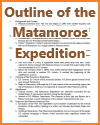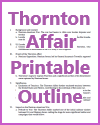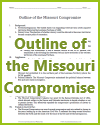Unit V: Westward Expansion and Regional Differences |
|---|
| www.studenthandouts.com > U.S. History > Westward Expansion > Outlines & PowerPoints |
 |
 |
 |
||||||||
| Outline of the Matamoros Expedition | Thornton Affair Printable Outline | Missouri Compromise Printable Outline |
|
Our free printable outlines can be valuable tools for American History students studying the antebellum period and the factors that led to the U.S. Civil War. They provide a structured framework for organizing and comprehending complex historical events and concepts.
Clarity and Organization: Outlines help students organize their thoughts and the information they gather. By breaking down the content into a clear and structured format, students can more easily grasp the chronological sequence of events and the relationships between causes and consequences. Identification of Key Events: Outlines allow students to identify and highlight key events, individuals, and turning points in the antebellum period. This helps them focus on essential information rather than getting lost in a sea of details. Chronological Understanding: Outlines emphasize the chronological order of events, enabling students to see how events unfolded over time. This perspective is critical for understanding the progression of tensions and conflicts that led to the Civil War. Categorization of Causes: Students can categorize the various causes of the Civil War, such as economic, social, political, and sectional factors. This categorization makes it easier to analyze and evaluate the significance of each cause. Thematic Exploration: Outlines can be organized by themes, allowing students to explore specific themes like slavery, states' rights, abolitionism, and economic disparities in depth. This thematic approach facilitates a deeper understanding of the complex issues at play. Visual Learning: Visual aids, such as charts and diagrams within outlines, help visual learners grasp complex historical relationships and patterns more effectively. Review and Study: Outlines serve as valuable study guides for exams and assessments. Students can use them to review key concepts, events, and causes, reinforcing their understanding of the material. Essay Planning: Outlines can be a helpful precursor to essay writing. They allow students to structure their essays logically by organizing their main points and supporting evidence in advance. Critical Thinking: Creating an outline requires students to think critically about the significance of historical events and their interconnections. This critical thinking process deepens their historical analysis skills. Reference Tool: Students can refer back to their outlines as a reference throughout the course to reinforce their understanding of the antebellum period and the factors leading to the Civil War. When using our free outlines, students should focus on key events like the Missouri Compromise, the Compromise of 1850, the Kansas-Nebraska Act, the Dred Scott decision, and the election of Abraham Lincoln, as well as broader themes like slavery's expansion and the breakdown of the Union. By using outlines as a learning tool, students can gain a comprehensive understanding of this pivotal period in American history. |
| www.studenthandouts.com > U.S. History > Westward Expansion > Outlines & PowerPoints |







